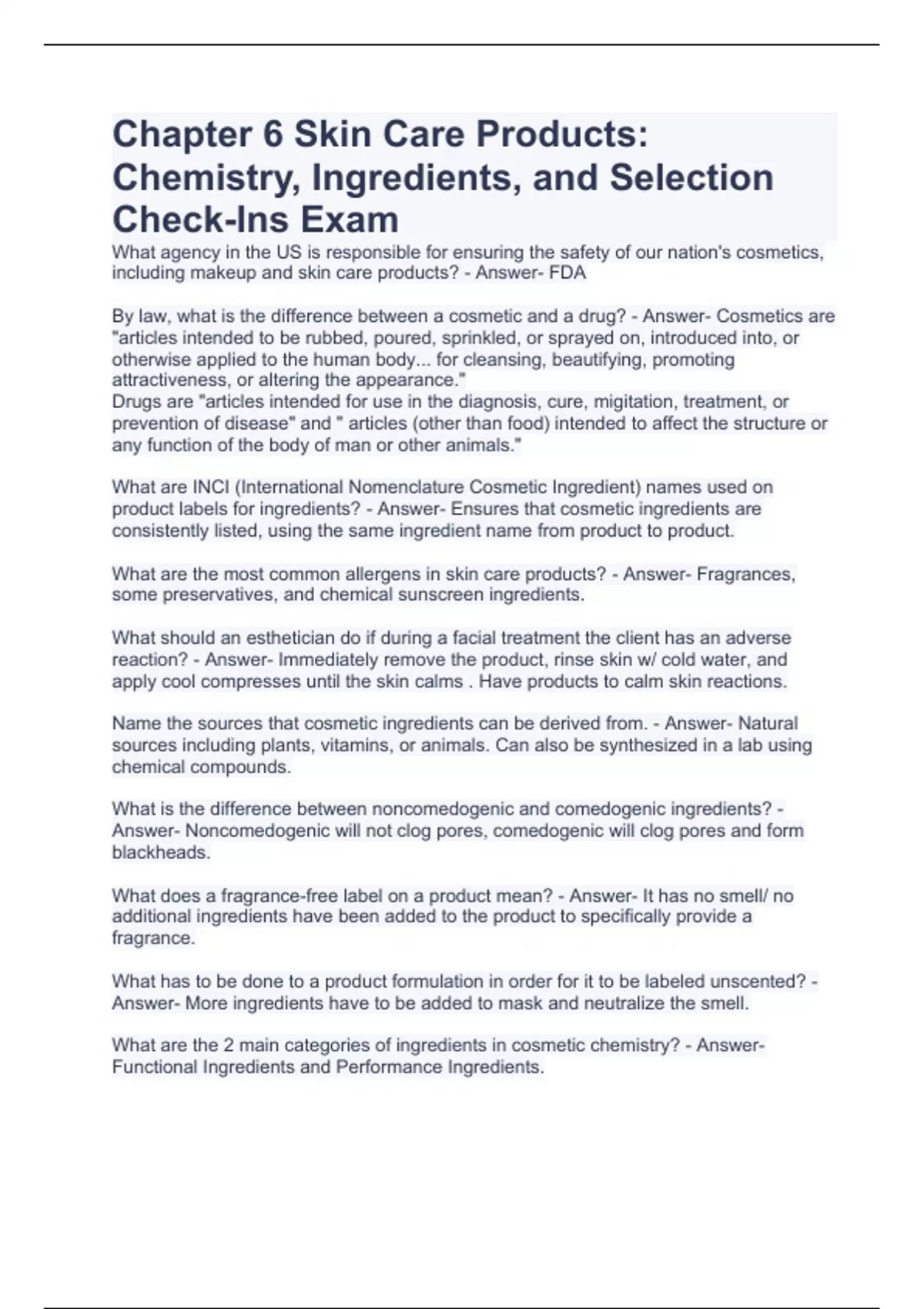Welcome to Chapter 6 of our skin care journey – where the magic of chemistry meets beauty!
Understanding the Basics of Skin Care Products
To keep our skin happy, we use many types of skin care products. But why? It’s because our skin needs help to stay clean, soft, and healthy. There are cleansers, moisturizers, and sunscreens which all work differently. They have special ingredients, or things inside them, that do the job.

Credit: www.stuvia.com
What Are Skin Care Ingredients?
Ingredients are the stuff that make up a product. Each one has a special role. They can clean our skin, make it soft, or protect it from the sun. Ingredients are mixed together by scientists to make sure they are safe and work well. When we learn what they do, we can pick the best products for our skin.
Peek into the Chemistry of Ingredients
Let’s look at some common ingredients and their superpowers:
| Ingredient | Superpower | Commonly Found In |
|---|---|---|
| Glycerin | Makes skin moist | Lotions, Soaps |
| Salicylic Acid | Helps clear pimples | Acne Treatments |
| Zinc Oxide | Shields from sun | Sunscreens |
| Collagen | Makes skin firm | Anti-aging Creams |
| Aloe Vera | Soothes skin | After-Sun Lotions |
Table: Examples of Skin Care Ingredients and Their Functions.

Credit: imgur.com
How to Pick the Right Skin Care Product
Choosing can be tricky, but worry not! Here’s how to be a wise picker:
- Know your skin type: Oily, dry, or combination? It matters a lot!
- Read the label: Ingredients are listed by amount. More means it’s in there a lot.
- Spot the essentials: Look for the ingredients that help your skin issue.
- Avoid bad stuff: Some ingredients can be mean to skin. Stay away from them.
Special Ingredients for Different Skin Types
Just like we have different hair and eyes, our skin is different too. Here’s a simple guide:
| Skin Type | Ingredients to Look For | Ingredients to Avoid |
|---|---|---|
| Oily Skin | Salicylic Acid, Tea Tree Oil | Heavy Oils |
| Dry Skin | Shea Butter, Hyaluronic Acid | Alcohol (bad type) |
| Combination Skin | Niacinamide, Green Tea | Artificial Fragrances |
| Sensitive Skin | Aloe Vera, Chamomile | Colorants |
Table: Skin Care Ingredients Tips for Different Skin Types.
Healthy Habits for Skin Care Shopping
Here are some golden rules to follow:
- Test it out: Try a little bit on your skin to see if it’s kind.
- Go simple: Less ingredients can mean less trouble for your skin.
- Ask experts: Doctors and skin pros know heaps. They can help a lot.
- Keep learning: Always be open to learning new things about skin care.
Bad Ingredients That Can Hide in Products
Sometimes, there are ingredients that can be not-so-great for our skin. Here’s what to watch for:
- Parabens: They keep germs away but may not be good all the time.
- Sulfates: They make bubbles but can also make skin sad.
- Phthalates: They make things bendy but might be sneaky.
- Synthetic dyes: They add color but nothing else that’s good.
Reading labels is like a treasure hunt. We can find the good and avoid the bad!
Always Watch for Reactions
Sometimes even good products can make skin angry. Signs can be red spots, itchy skin, or pimples. When this happens, say ‘no thanks’ to the product. And maybe chat with a skin doctor.
Final Thoughts
Remember, what works for you might not work for others. Skin care is very personal. It’s an adventure! Stick with what makes your skin smile. And don’t forget, the best ingredient of all is love and care for your skin.
Frequently Asked Questions Of Chapter 6 Skin Care Products Chemistry Ingredients And Selection
What Are Key Ingredients In Skin Care Products?
Skin care products commonly include hydrators like hyaluronic acid, vitamins such as C and E, retinoids, peptides, and sunscreens.
How Do Antioxidants Benefit Skin Health?
Antioxidants in skin care protect against environmental damage and can visibly reduce wrinkles and skin dullness.
What Role Do Peptides Play In Skin Care?
Peptides aid in skin repair and rejuvenation by signalling cells to produce more collagen, resulting in firmer skin.
Are Parabens In Skin Care Products Safe?
Recent studies suggest that parabens are safe in low concentrations, but some consumers prefer paraben-free options due to personal concerns.